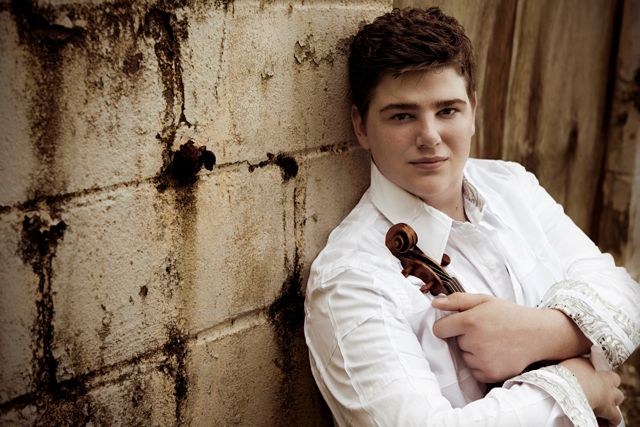By Stephen Brookes • The Washington Post • January 29, 2016
The gifted young violinist Chad Hoopes has been rising — or maybe hurtling — toward international stardom since taking first prize in the junior division of the Yehudi Menuhin International Violin Competition in 2008. Now 21, with a string of recording and concert successes behind him, Hoopes made his Kennedy Center debut at the Terrace Theater on Thursday evening and displayed not only the jaw-dropping virtuosity that’s become almost the norm in young professionals, but also a gift for dramatic pacing and a distinctive, convincing sense of poetry. Accompanied by the Australian pianist David Fung, Hoopes opened with Antonín Dvorák’s pleasant little Sonatina in G for Violin and Piano, Op. 100. Written in 1893 as a piece for his children and flavored with American folk melodies, the piece isn’t too technically demanding, and you won’t work up much of a sweat plumbing its emotional depths either.
Accompanied by the Australian pianist David Fung, Hoopes opened with Antonín Dvorák’s pleasant little Sonatina in G for Violin and Piano, Op. 100. Written in 1893 as a piece for his children and flavored with American folk melodies, the piece isn’t too technically demanding, and you won’t work up much of a sweat plumbing its emotional depths either.
But the infinitely more compelling “Five Melodies, Op. 35” by Sergei Prokofiev more than made up for it. This remarkable set of miniatures was originally written as a “song without words” for soprano, but the version for violin allows for a much richer sonic texture and complexity, without sacrificing any of the intense lyricism. Hoopes and Fung turned in a glowing — even, to these ears, a little intoxicating — reading that shimmered with exotic colors, heightened by elegant little jabs of Prokofievan violence.
Hoopes’s assured and vivid playing was deftly supported by Fung, who seemed to dance with the keyboard all evening (and whose life-of-its-own “fauxhawk” threatened at times to steal the show). That interplay continued through a smiling-slash-snarling reading of Maurice Ravel’s feral, gypsy-flavored “Tzigane” and into Cesar Franck’s much-loved Sonata in A for Violin and Piano. It was here that Hoopes’s sense of lyricism, gripping dramatic flow and intellectual depth all came together in a bravura performance that won the duo a standing ovation. The evening ended with two encores, Fritz Kreisler’s charming “Syncopation” from 1925 and Mozart’s Adagio in E, for a quiet end to an impressive Kennedy Center debut.